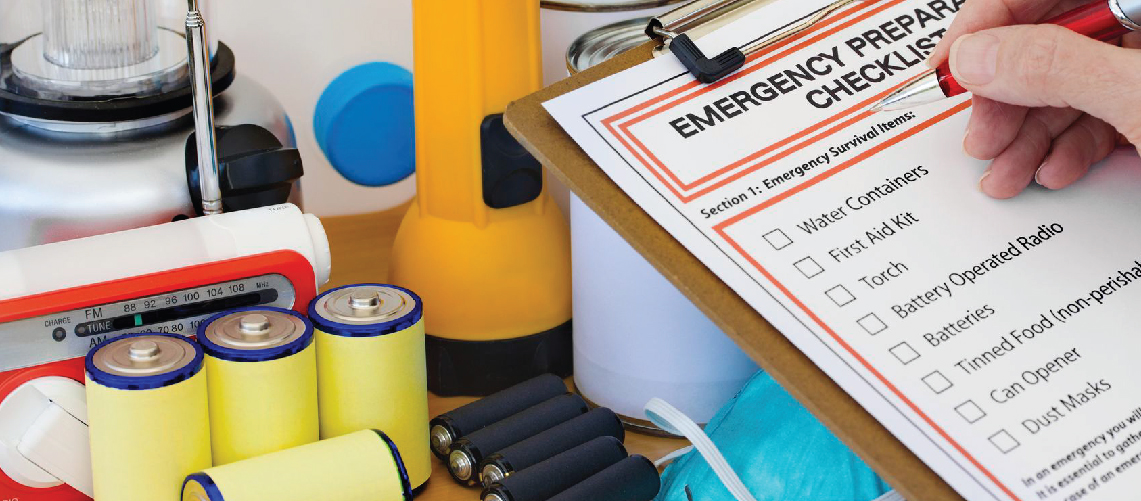In today’s world, constantly changing and unpredictable weather patterns, emergence of new diseases, natural calamities and rise of global terrorism pose a strong threat to public health and well-being everywhere. Since these events occur without any precedence or warning and can strike any geographical location, emergency preparedness and response plays a crucial role. Home emergency preparedness largely pertains to quickly responding to and taking corrective action for recovering from the situations which hinder the normal routines.
Emergencies may be classified as natural or man-made. Examples include earthquakes, floods, cyclones, epidemic outbreaks, home fire, burst pipes, gas leakage, nuclear explosions, chemical spills, accidents and the like. It is important that people stay safe before, during and after the occurrence of natural calamities or emergencies. Extra precautions must be taken in the context of patients, senior citizens, young children and disabled people as they are more vulnerable.
The Emergency Preparation Guide helps us to be proactively equipped to handle an emergency by stocking the necessary supplies and using them appropriately. These items must be readily arranged in a portable kit which is easily accessible or can be carried along during evacuation.
The Emergency Preparedness Kit must contain the following -
- Sufficient quantity of drinking water for all family members for at least three days
- Non-perishable and easy-to-prepare food items
- Emergency flashlight/torches with extra batteries
- Radio
- First Aid Kit
- Weekly stock of medications, baby supplies (example: diapers, feeding bottles, formula powder, readymade infant foods), medical supplies (example: hearing aids, syringes, spectacles, dietary supplements, contact lenses), sanitation items and personal hygiene goods.
- Emergency contact information
- Multi-purpose toolkit
- Cell phones with chargers and power banks
- Copies of Important documents including medical records and history, passport, health insurance policies, birth certificates and proof of residence
- Extra cash
- Local maps
- Emergency Blankets and Sleeping Bags
- Extra clothes
Additionally, other essential items may include pet supplies, extra home and vehicle keys, towels, gloves, rain gear, plastic sheets and household disinfectants. Let us next understand the First Aid process to be followed during a health emergency or disaster.
Emergency First Aid (EFA)
EFA is administered with the object of
- Ensuring the victim is alive.
- Preventing the worsening of the victim’s condition or symptoms.
- Administering the First Aid until the medical help arrives. The basic first aid to be given can vary based on the patient’s injury or health condition(examples include injury, bleeding wounds, burns, blisters, fractures, cardiac arrest, strokes, sprains, drowning and insect bites). The specific procedures for each must be followed as per the guidelines given in the Emergency First Aid Guide. It is important that trained persons administer the first aid to the patient. They must clean their hands thoroughly with disinfectants before the process to prevent infection. It is equally crucial to clean the surrounding area and make the victim lie down before administering EFA.
- Ensuring that the victim gets the required medical assistance by calling the EMS Ambulance (EMS-Emergency Medical Service) for expediting the treatment process.
Some Home Safety Tips
- Taking adequate steps for fall prevention by using anti-skid mats, ambient lightings, grab-bars in bathrooms, railings for staircases, removing obstacles and keeping essential items handy and accessible.
- Installing fire extinguishers, smoke detectors and burglar alarms at home.
- Ensuring that all electric appliances are regularly serviced to avoid the risk of fires and shocks.
- Maintaining gardens and yards properly by clearing the clutter and debris to avoid trips, skids, injuries, insect bites and infections.
- Having good ventilation at home to avoid suffocation and other health issues.
- Double checking all food and medicinal items for expiration dates and promptly discarding them after expiry.



